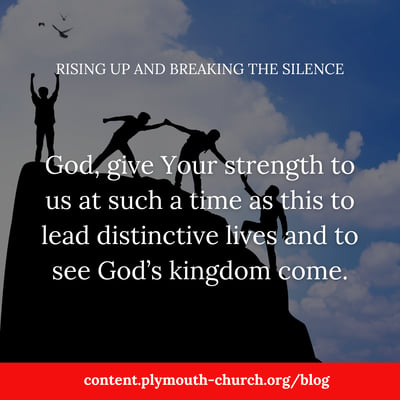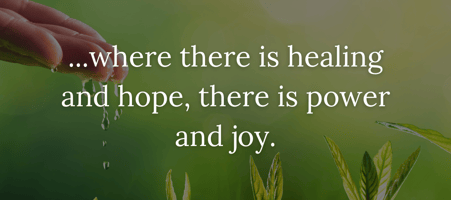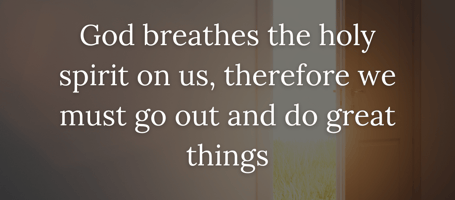This blog is based on a sermon by Pastor Teresa Howell-Smith on January 19, 2025 Mother Teresa was...
Rising Up and Breaking the Silence

This blog is based on a sermon by Pastor Teresa Howell-Smith on May 11, 2025
We all reach those moments where the weight of repetition becomes a catalyst for change. Whether it's the unending cycle of daily tasks or the persistent sting of injustice, a sense of “enough is enough” arises.
We see this in historical figures such as Claudette Colvin, the first Black woman to sit on the bus and refuse to give up her seat to a white passenger. We see this in Rosa Parks, whose refusal to yield sparked movement.
This inherent human drive to break free from the cycles finds a powerful echo in the Biblical story of Esther. The Book of Esther recounts a time of rising peril for the Jewish people. Yet it begins with a seemingly personal act of defiance: Queen Vashti’s refusal to obey a demeaning royal command. This act, though consequential for her, sets the stage for Esther’s eventual rise and the pivotal movement that she faced.
I'm reminded as I think about the story of Esther that one of my theological professors used to say that we stand on the prayers of others. Maybe we stand on the prayers that our grandparents made – prayers that we don’t even know that they made. I think and believe that for Esther in the story, we see that she stands on the prayers of Vashti and many of the Biblical women who had the courage to say no.
Learning of a plot for genocide, Esther had to recognize the significance of her position and choose to act. Mordecai’s poignant word for such a time as this encapsulates the idea that our individual journeys, even those marked by seemingly ordinary periods, can prepare us for extraordinary moments. Esther’s years in the palace, perhaps living a passive life, positioned her for this critical juncture.
Similarly in our own lives, the daily acts of faithfulness and perseverance can build the foundations of moments for when we're called to step forward with courage.
When we celebrate Mother’s Day, we recognize the countless pivotal moments both large and small that shape families and communities. Like Esther, mothers, aunts, grandparents and teachers often act with quiet strength and unwavering dedication. Their seemingly routine efforts create a profound impact – not only on the people in their own mission field but in their communities. Esther's stories, though lacking explicit divine intervention, underscore the reality that God often works through the courage and faithfulness of individuals who respond with bravery to make a difference.
One of the interesting facts when we look at the Book of Esther is that it's one of two books where God’s name isn't mentioned. Yet we see God’s fingerprints throughout. Since the book of Esther is one of the 66 books that comprised a larger work, even though God does not appear in the book of Esther, it's clear that He shows up on every page.
One way we see God is through the lenses of His sovereignty. The events of the book of Esther are not random without a plan, but just like how it can feel in our own lives, it feels like God has removed His hand and has closed the door.
Esther spent five years waiting for such a time as this when God placed her in that palace, and so it goes throughout the scriptures. Moses spent 40 years in the Egyptian court and 40 more obscure years in the deserts of Midian before God called him to confront Pharaoh and deliver the people of Israel. King David experienced long years and dark nights on the run from King Saul before God placed him on the throne over Israel. John the Baptist spent long years in the desert before God called him to His ministry to become the forerunner of His messiah. Paul spent three years in the Arabian desert before he went up to Jerusalem to get the church liturgist’s blessing to launch a ministry. And even Jesus was 30 years old before he began his public ministry. His public life before that was so routine and mundane that subsequent generations were wondering what His life was like before.
The point here is simply that God is pleased with our routine of faithfulness, obedience and sometimes just simply the day to day work in our mission field. That Esther and Mordecai were called to resist in different ways. Some of us might resist, like Mordecai who used his refusal to draw ethnic hatred out of the shadows and into the light of the day where it could be exposed and recognized.
Some of us might resist like Esther, who truly negotiated the halls of power to save the lives of her people. She resisted by studiously following royal protocols and speaking the language of power, winning the king to her side. But if we are to defeat the powers of hatred, we must all resist. Whoever we are, wherever we are, perhaps our lives have been preparing us for such a time as this. For it was at this crucial juncture that Mordecai delivered that challenge.
Who knows if it is such a time as this that you obtain the royal position. We saw that shift in Esther, who was no longer simply just taking the orders of Mordecai, but was telling him what to do. She's no longer passive and playing into the roles. The culmination of this transformation is that she tells the people to go and gather all the Jews and marks her emergence as a leader for her entire people. She moves again from following Mordecai's instructions to giving them, from being silent and benign to speaking with authority. The once silent orphan becomes the voice of her people – her words preserved for generations to come.
Again, Mordecai's famous words for such a time as this continue to challenge each generation. They remind us of our personal circumstances, struggles and set backs. Like Esther, we are called to recognize these moments when we must choose between comfortable silence and risky advocacy for our people and beliefs.
We have all heard God whisper the words as Mordecai reminded Esther: perhaps you have been born for such a time as this. What is your time at this moment? How do you find your “no?” Perhaps your “no” is the evasiveness of time that keeps stealing you away from things that are important. Perhaps your “no” is that you have been called to serve as an ally to the LGBTQIA community. Perhaps you have been called to your “no,” that you’re not simply going to go through the motions anymore and that you’re going to live with purpose. Perhaps your “no” for such a time as this is that you are going to speak out and speak boldly and live in such a way that God is pleased and that you love yourself.
Perhaps you have been called to your “no” to see the love in other people and to adjust the crown of another woman who is struggling. I leave you with these words: if we remain silent, who will rise up? If we close our eyes and turn our heads, who will see the injustice? If we wring our hands and shuffle our feet, who will act with mercy? What if we were called for such a time as this to see through different eyes and move to the beat of a different drum? God, give Your strength to us at such a time as this to lead distinctive lives and to see God’s kingdom come. That is not just for some, but is for all.
Hallelujah and Amen.



